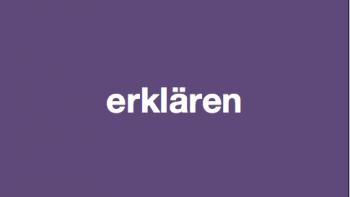Archive for 'Grammar'
German-Dutch in the mix Posted by Sten on Sep 27, 2014
The Netherlands and Germany are two countries that could not oppose each other in certain ways: soccer, language, some cultural traits, morals, fashion styles… But they also find harmony. There are many activities that connect both countries. Not only economically. I grew up in a small German town on the Dutch border and went to…
German grammar in use: The conjugation of the verb “erklären” Posted by Sandra Rösner on Sep 25, 2014
The common English translation for the German verb “erklären” is to explain. Further, it can mean to declare, to state, or to define — depending on context. Below you can find some example sentences with the German verb “erklären” and its conjugations. Präsens – Present tense Singular Plural 1st person ich erkläre wir erklären 2nd…
German grammar in use: The conjugation of the verb “sehen” Posted by Sandra Rösner on Sep 15, 2014
The German verb sehen (to see; to look; to face) is a strong verb, which means that it has another root vowel in the preterit. In the overview below you can find the conjugations of the verb sehen in the German tenses: Präsens, Imperativ, Präteritum, Futur I, Perfekt and Futur II. The additional examples are…
German grammar in use: The conjugation of the verb “kommen” Posted by Sandra Rösner on Sep 8, 2014
The German verb kommen is an irregular verb. That is, there is a vowel change when you form its past. The common English translation of kommen is “to come” or “to arrive”. But kommen is also used in several phrases. Check out the example sentences below to find out how the verb kommen is used…
German grammar in use: The conjugation of the verb “machen” Posted by Sandra Rösner on Sep 1, 2014
The regular German verb machen means “to do” or “to make” in English. But machen is also used in various compounds in German, which have specific English translations. In these specific translations the English verbs “to do” and “to make” need not occur necessarily. Präsens – Present tense In German the Präsens is used to…
German grammar in use: The conjugation of the verb “gehen” Posted by Sandra Rösner on Aug 25, 2014
The German verb gehen has got several English translations. First of all, it means to go, to walk, to leave, and to attend. But gehen is also used in German to say that something works or is feasible. Let’s have a closer look, which meanings gehen can have in the German tenses. Präsens –…
The conjugation of the German verb “stehen” Posted by Sandra Rösner on Aug 18, 2014
The German verb “stehen” is commonly translated into English “to be”, “to stand” or “to suit”. Below you can find its conjugations for the following tenses: – Präsens – present – Präteritum – preterit (equals simple past) – Futur I – future I – Perfekt – perfect – Plusaquamperfekt – pluperfect (equals past perfect) – …




